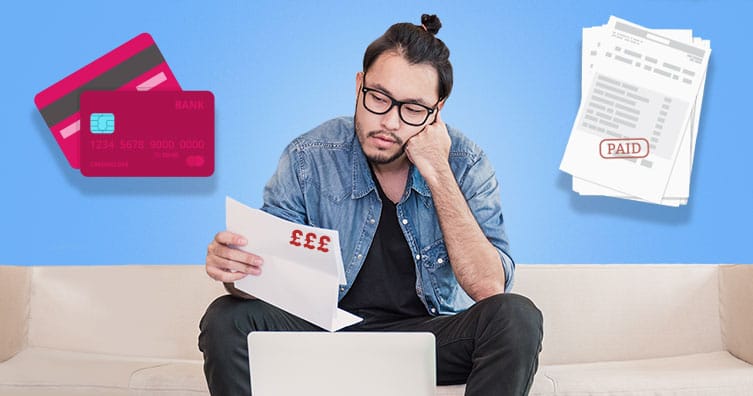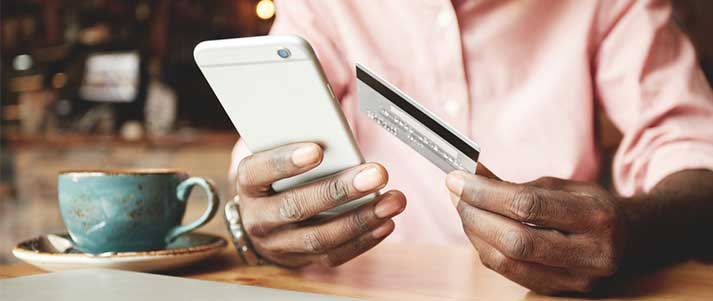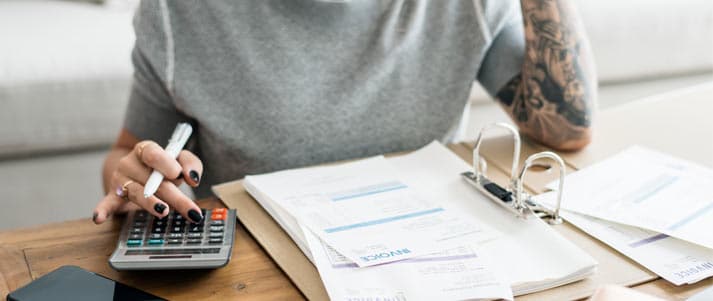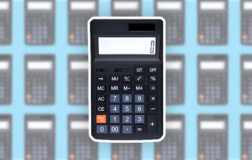Managing debt at university
Leaning on credit cards, loans and overdrafts to get by at university? Try not to let it overwhelm you – this guide's here to help you deal with debt and keep on top of your finances.

Credit: paulaphoto, Succo Design, Sky vectors – Shutterstock
Debt is common among students, yet most advice (wrongly) focuses on repaying the Student Loan instead of the debts you're most likely to have while at uni: credit cards, loans and even household bills.
Plus, there can be a fair amount of confusion about the difference between good debt and bad debt, and how to manage both kinds.
We want students to know there's more to debt than boom and bust. Credit can help you move forward in life – but the key is using it properly. Read on to find out all about dealing with debt, including what debt looks like, how to profit from it and when to avoid it.
What's in this guide?
What is debt?
Simply put, debt is money that you've borrowed and are expected to pay back. The twist is that banks and other commercial lenders usually add interest or fees on top, so you end up paying back more than you originally borrowed.
The most common types of credit (i.e. ways of borrowing) include credit cards, overdrafts and loans, but even household bills can cause you to fall into debt if you don't keep an eye on them.
Debt can be useful, but borrowing more than you can afford to pay back, or falling behind on repayments, is where things get stressful. It can even start to limit your life choices, which is what people usually mean when they say they're 'in debt'.
Are you in debt if you have a Student Loan?
As a student, you may feel like you are 'in debt' simply by taking out a Student Loan from the government – but we'd urge you not to think of this as a debt problem.
Worrying about owing thousands on a Student Loan is understandable yet often unnecessary. Despite the name, this official funding isn't like any other loan out there. In fact, it's more like a graduate tax.
Repayments start after you leave your course and are earning enough but, crucially, they flex with your income. So if you have a month where you don't earn as much, you'll make smaller (or even no) repayments. Then, when your income increases again, you'll make slightly bigger repayments.
Most graduates will make loan repayments automatically through their employer, so you don't have to worry about forgetting to pay or falling behind.
Although you can't avoid paying back your Student Loan, the good news is that there's a good chance that it could get written off before you've finished paying it all off.
Depending on the type of loan you have (Plan 1, 2, 4 or 5) and which part of the UK you're from, you can expect your Student Loan to get written off after 25, 30 or 40 years from the April you were first due to repay.
Our guide to Student Loan repayments explains this in more detail and covers all the key info about paying back official funding. And you can read on to learn about the day-to-day debt students have to deal with at university.
Good and bad debt explained
Good debt is credit you take on for the right reasons, at the best price, and with a solid plan, like a mortgage, or a credit card that you've taken out with the intention to improve your credit score. This kind of debt helps you move forward in life.
The Student Loan is an example of good debt, because getting a degree should leave you better off in the long run. Not only is it one of the cheapest ways of borrowing, but Student Loan repayments are tailored to your income – so they're always affordable.
Bad debt is the opposite. It's credit you get on impulse or for non-essentials, and without planning for repayments. For example, if you take out a credit card to buy something you couldn't otherwise afford, and you'll struggle to keep up with repayments, this is bad debt.
With bad debt, you would likely end up paying more interest or fees than necessary. Bad debt tends to be more stressful, and a lot more expensive.
Should you take out credit?
Before paying for something with a credit card, overdraft, loan or another form of credit, always ask yourself:
- Do I need it?
- Do I have to buy it right now or can it wait?
- Am I willing to pay more than the item costs (i.e. with added interest)?
- If not, can I pay the balance in full when the statement arrives?
- If I can't pay in full, can I afford the monthly repayments?
If you answer 'no' to any of the above, or you don't regularly track your money, borrowing may not be right for you. Saving money will take longer, but it's a lot safer (and usually cheaper).
But, if you answered 'yes' to all of the above questions and you're confident the credit would be good debt, here are some tips to use credit as safely as possible:
- Plan for cash emergencies – In case your Student Loan isn't enough, it's best to plan ahead so you've got the cheapest credit card or a 0% overdraft on standby. And, again, your savings will be a safer alternative to credit so you could consider opening a savings account.
- Avoid only repaying the minimum amounts – This is likely to be more expensive in the long run because of the extra interest you'll be charged before you've repaid the credit in full. Only being able to afford minimum repayments could be a sign that the credit option isn't right for you.
- Don't ignore persistent debt – If you regularly rely on a credit card or overdraft to afford daily essentials like food, rent or bills, further financial help may be available to you. Check you've got all the student bursaries you're entitled to, then ask a university money advisor to help you get your finances in shape.
What is a credit score?
Your credit score reveals how disciplined you are with money. You're graded on things like paying your credit card or gas bill on time, whether you're on the electoral roll, and how much debt you owe. Your combined points make up your credit score.
Companies might run a 'credit check' on this score before giving you a loan, overdraft or even a mobile phone contract. A high score could open the door to cheaper deals, while a low score could mean being refused credit altogether.
Credit scores are crucial. You can improve your score by staying on top of debt and managing your finances well. And, if you're thinking about borrowing credit, start by boosting your credit rating.
Keeping up with debt repayments

Credit: WAYHOME studio – Shutterstock
When it comes to repaying debt, it's important to try to pay off debts as early as possible. If you're struggling to keep up with payments, seek debt advice to get back on track.
Before taking out any credit, make sure you think about it carefully first – if you're confident you'll be able to manage the repayments and that it will be good debt, it could be worth taking it out.
If you think it might be tricky for you to repay the debt on time, it could be bad debt, so we'd strongly suggest you avoid taking out the credit.
What happens if you miss credit repayments?
There are always consequences if you don't pay debts on time. How serious these are will depend on how much you owe, and who the credit lender is.
If you miss repayments for credit, the following steps are likely to happen:
- After missing a payment deadline, you'll get a reminder urging you to pay as soon as possible. Once this grace period runs out, you could be hit with penalty fees or extra interest.
- Ignoring reminders or regularly missing payment deadlines will trigger a scarier-sounding written warning, and/or an invitation to get payment advice from the lender.
- If you continue to build up more debt without paying it back, your lender might take steps to limit the damage (i.e. they could block your credit card or cut off the electricity).
- Some lenders may threaten to take you to court or hire a debt collection agency to get you to pay up. They may try to add the cost of this to your debt as well.
Any of these stages can affect your credit score. Late penalties and County Court Judgments (legal action against unpaid debts) can sit on your credit file for six years, so take action or get advice as early as possible.
Remember that falling behind on one debt can affect your other finances, too. For example, overspending on an overdraft could leave you too skint to cover household bills, meaning you fall behind on those payments as well. It's important to keep to your budget.
Dealing with debt
If you're a student in debt, here is how to deal with it:
Do you have a debt problem?
You don't need to owe a lender thousands of pounds to start feeling the pressures of debt. But when should you do something about your debt, and how do you know if it's a problem?
Everyone has their own tolerance for managing debt, but there are key warning signs to watch out for and avoid:
- You regularly use a credit card or overdraft to cover daily costs like groceries or petrol
- You're late paying bills or making repayments
- You're worried about money
- You're juggling multiple debts on a low income
- You hide or avoid looking at bank statements, receipts and bills
- You've had warnings from a lender, bailiff or a legal organisation.
Sometimes creating a solid budget can really help you to get back on track. At other times, you need a strong cup of tea and some real talk with your parents, a university money advisor or a debt advisor. Whatever route you take, the important thing is to take action.
Where to get debt advice
It's important to get impartial advice about debt. This usually means asking an expert who doesn't earn a commission from recommending financial products.
The organisations listed below are the ones students should turn to first for free financial advice:
Debt advice
You should also keep your credit lender in the loop if you're struggling – they have a duty to assist customers struggling with debt.
Guidance about your rights as a credit borrower
- Citizens Advice (general advice)
- Shelter (housing advice)
- Disability Rights UK.
Advice on managing money
- Student money advisor at your uni (visit NASMA to get contact details)
- Friends and family, especially for moral support.
How to clear debt

Credit: Atanas Bezov - Shutterstock
If you're worried about debt, it's super important to seek official advice. Money advisors will help you figure out your next steps to start clearing your debt, and they'll inform you of your legal rights.
Here are some key changes you could make to start clearing your debt:
- Cut back on non-essential spending
- Work out how much to pay each week to clear your debt
- Find ways to make money or find funding
- Pay your most expensive debts first
- Talk to your lender (or the person you owe) and see how they can support you
- Get professional advice to check you're on the right track.
Tips for clearing common types of debt
Here are the most common forms of debt for students, plus advice on how to manage them:
-
Rent and bills
Household bills (e.g. heating, broadband or a phone contract) may not be the first things that come to mind when you think of forms of credit, but they have some big similarities to loans.
Not only could you be required to pass a credit check to get the best deals but, if you fall behind on payments, there will be similar issues as if you were to miss credit card payments, for example.
Paying late or ignoring reminders for rent and bills could mean being moved onto a prepaid service or having your energy supply cut off. Your details may be passed to a debt collection agency, which would start asking you for the money.
If you continue to miss payments, your lender or landlord could even threaten to take you to court to get the money they're owed. Plus, these situations could harm your credit score and cause problems when you next try to put bills in your name.
For this reason, have a proper plan for splitting bills with flatmates, and make sure everyone is named on shared agreements. If you're the only one, you could be landed with all the responsibility if things go wrong.
Direct Debits make it much easier to pay bills quickly as the payments will be made automatically. Just make sure you keep enough money in your bank account to cover the payments, to avoid going into rent arrears (debt related to rent) as much as possible.
As well as using Direct Debit to pay rent and bills, make sure you are budgeting carefully to keep on top of the money coming in and going out of your account.
How to pay off rent arrears
Falling behind on household rent and bills can be pretty stressful. It's important to act quickly when you start to struggle with payments to avoid being in rent arrears as much as possible.
Contact your supplier, council or landlord as soon as possible so that they can work out a payment schedule with you.
It's also important to get support to know the best route to take moving forward. If you have other debts on top of rent arrears, organisations like Citizens Advice can help you work out what to pay off first, as well as advise you on changes you can make to stay out of debt in future.
-
Overdrafts
An overdraft lets you spend more money than you have in your account, up to a pre-agreed limit (usually £1,000 – £3,000, depending on your bank account and credit score).
Think of it as a loan you can dip into for unexpected costs or emergencies, like if you find that your Student Loan isn't enough to get by until the end of term.
Your student bank account will likely come with a 0% student overdraft – this is one of the best ways to borrow. Used properly, they're free of interest, fees or other charges, but you have to know the rules of overdrafts to reap the benefits:
- An agreed overdraft can save you money if you ever accidentally overspend or need extra funds, but spend it wisely. It's not free cash.
- Read the terms and plan how you'll pay back anything you borrow.
- Shop for the best overdraft – and switch banks if you find a better deal later on.
Spending more than the limit (or overspending without an agreed overdraft) usually means paying extra fees or interest. Some banks will even just cut off your spending – a major pain if you have important payments lined up.
You might also be charged for any payments that bounce if you're not able to pay from your overdraft.
Once a student or graduate bank account expires, so do the perks, such as the 0% overdraft. If you still have a negative balance at this point, you'll start racking up interest on whatever you owe.
It's important to start budgeting to pay back your overdraft a few months before this happens.
How to pay off your overdraft
If you're struggling to clear your overdraft or stay within your credit limit, start by improving your budgeting skills (your university's student money adviser can help you with this).
Remember that you can be eligible for a graduate account (with a 0% overdraft) for up to three years after uni. If you haven't already switched, this could save on interest charges while you pay off an existing balance.
-
Credit cards

When you pay by credit card, you're actually borrowing the money from the card provider (usually a bank). You have to repay this money later on.
Credit cards come with lots of benefits. For example, they have the potential to give you financial flexibility, improve your credit score and protect your consumer rights on purchases over £100.
But, to benefit from the perks, it's vital to pay the balance in full when you get your monthly card statement. If you do this, you can avoid getting charged interest or charges, making the cost of borrowing free.
Paying in instalments can be handy, but the longer you take to clear the credit payments, the more you'll pay in interest. Used in this way, credit cards make every purchase more expensive.
If you use a credit card, you'll need to regularly shop around for the best interest rate to keep costs down.
The most obvious consequence of falling behind is that your debt could get bigger. Most lenders charge for late payments, not meeting the minimum repayment amount, and exceeding your credit limit (plus a fee each time a purchase bounces as a result).
Bear in mind that a 0% card won't save you from penalty charges. Whatever kind of deal you're on, not sticking to the terms, like paying late, could hurt your credit score.
How to pay off credit card debt
Paying the balance in full each month is the best way to manage credit card debt. If you can't do this, set up a Direct Debit from your current account for the minimum repayment amount or more. Make sure to keep enough money in your account to cover this!
If you're struggling with repayments, stop non-essential spending immediately. Some students put their cards away somewhere secure while focusing on paying back what they owe, for example by taking on extra shifts at work or spending less.
Talk to the money adviser at your university if you need to, and get in touch with the credit card company to explain your situation. They may be able to pause penalty charges or work out a payment schedule with you until you're back on track with repayments.
-
Store cards
Store cards are like credit cards that can only be used in the store or chain that gives you the card. Don't confuse them with store-branded credit cards (e.g. the Amazon or Sainsbury's credit card), which can be used anywhere.
Store cards come bundled with discounts, offers or reward points to hook you into spending more than you should. On top of that, they usually charge much higher interest than credit cards. This can prove pricey if you repay in instalments, or if you ever pay late.
As with credit cards, store card lenders might load extra charges onto your balance if you pay late, miss a payment or spend more than the credit limit. These, along with interest applied to any outstanding balance, can make it harder to pay back what you owe.
If you're determined to get one, always pay your statement in full each month. Or even better, once you've claimed any sign-up benefits, clear the balance and then close your account.
How to pay off store card debt
Paying the full balance quickly keeps the cost of borrowing to a minimum. With smaller amounts, you may be able to do this by using savings, a part-time job or self-employment.
If you find you're struggling to manage store card payments, don't delay in talking to a debt charity like StepChange, or make an appointment with your student money adviser. They can help you approach paying off the debt and staying on top of credit payments in future.
-
Klarna (buy now, pay later)
Klarna is a way to buy now and pay later at a ton of online stores including ASOS, Michael Kors, and Gymshark. When you choose Klarna at the checkout, there are usually two options: either get up to 30 days to pay what you owe, or pay in three interest-free instalments.
This, at first glance, sounds great – but it can come back to bite.
You're actually more likely to spend more when you use buy now, pay later (BNPL) services. It's too easy to fall into the trap of adding more to your bag than you would usually when you don't need to pay for it immediately.
The big selling point of Klarna Pay Later is that there are no fees or interest to pay. A nice perk... until you miss payment deadlines.
How to pay off Klarna debt
If you intend to buy something with a buy now, pay later service like Klarna, triple-check you'll have the money ready to pay by the deadline. Set yourself a goal of earning extra cash each week and cutting back on unnecessary spending before the payment is due if you need to.
Once you are up to date with payments, we would advise keeping your future use of BNPL services like Klarna to a minimum (or not using them at all).
If you're confident you'll have the money to pay for something in 30 days, it's worth waiting until then to buy it if you can. This avoids the risk of missing BNPL payments, and it gives you longer to mull over your purchase and decide if you really need it.
-
Loans
You might consider a loan if you need cash for a hefty purchase (e.g. a car) or in an emergency. You also might hear of people consolidating several debts into one single loan (but don't do this without getting advice!).
There are several types of organisations that offer loans:
- Banks
- Credit unions (a kind of community bank)
- Commercial lenders
- The government (i.e. a Student Loan or Postgraduate Loan)
- Peer to peer lenders
- Specialist lenders, such as car finance companies.
Loans sometimes go by different names, such as a mortgage (when buying property) or hire purchase (when buying a car), but they work in very similar ways.
To get a loan, you'd need to pass a credit check, so you may need to build your credit score first. You might also have to pay an arrangement fee, as well as interest for the life of the loan. The interest rate you get might depend on your credit score, too.
Repayments to private lenders and banks are nowhere near as flexible as the government's Student Loan: commercial lenders will expect you to pay each month on the dot, even if you're a student or not earning very much.
Missing a loan repayment can cause a raft of consequences, including penalty fees or legal demands. As loans tend to be for large amounts, it's possible for things to get out of control much faster – so take action quickly.
With a 'secured loan', repayments are offset against something you own (like your home or car) or by a guarantor (someone who's willing to pay up if you can't). Secured loans tend to be cheaper than non-secured loans, but falling behind could put your belongings or guarantor at risk.
How to pay off loan debt
Never commit to a loan without being sure you can stick to the entire repayment plan. If your loan lets you make overpayments for free, it may be worth raising extra cash to help pay it off sooner.
If you struggle to make a payment, contact your lender immediately. They may be able to work out a payment plan with you to help you manage the loan until you're on top of your finances again.
Again, it's super important to get help from a debt advice organisation or a money advisor at your university for guidance on how to approach paying off your debt.
Get advice before turning to loans for tuition fees or study costs. A Student Loan, bursaries, grants or scholarships could save you thousands and are far safer. -
Payday loans

We advise against taking out payday loans.
They tend to give out short-term cash advances, usually for a month at a time, though some lenders give longer terms. You can be accepted for a loan and get the cash within minutes, often without needing to pass a credit check or pay any fees. There's a reason for that!
Top of the danger list is the amount of interest charged by payday loan lenders. Rates are far higher than other types of credit and can lead to huge added debts.
With a true payday loan, the lender takes the full amount you borrowed (plus interest) from your bank account automatically when you next get paid. With an instalment-style loan, you repay a set amount every month instead.
Payday loans are not the right option for students. Too often they just squeeze money out of people who can't get a better deal elsewhere, or who aren't aware of the alternatives to payday loans.
There are limits on how much payday lenders can charge, even if you fall behind on the loan. But, late or missed payments could really damage your credit score. In the worst case, you could end up being chased by debt collectors, or threatened with legal action and expenses.
How to pay off payday loan debt
If you can't keep up with repayments, contact the lender immediately. One of these debt charities can tell you your rights and give financial advice, so check in with them, too.
Don't take on any more loans without advice.
-
University debt
You pay your university masses of cash in the form of tuition fees and other course costs, so you'd think they'd have your back. Yet while universities spend a lot of time, money and effort on student support, you're unlikely to get much slack if you owe them money.
This isn't just about tuition fees. It also includes things like library fines or money you owe for services, such as accommodation or gym and sports facilities.
If you have unpaid tuition or accommodation fees on your account, you might not be able to progress on your course until you pay up. Worryingly, some universities have been known to stop students from getting their results or even graduating for unpaid library fines.
How to pay off university debt
Your uni should contact you about unpaid fees or fines before they're overdue, so this is the time to pay anything you owe.
If you're struggling to clear the debt, contact the uni and ask about your next options, and find out how they can support you.
It's also worth getting backup support in place, especially if you're worried about disruption to your studies or graduation. Contact your students' union or the National Union of Students (NUS) for further advice.
-
Family and friends
When you're short on cash, friends and family lending you a bit of money (or even non-financial support) can be a huge help. It's also far safer than loading up on credit. But that doesn't mean borrowing money from your loved ones is always the right choice.
It's tempting to see loans between friends and family as free cash, but bailing on debts could end up harming your relationships. Here are some tips for paying back friends and family:
- Avoid taking cash from anyone struggling with money, as this could ramp up the pressure on both of you.
- If the money is a gift, it should be up to you how you spend it – but it's important to make sure.
- If it's a loan, ask when you're expected to pay it back, and what happens if the payment is late. Depending on the amount they lend, you might want to get the full agreement in writing.
- Only borrow money from friends in emergencies – it's easy to fall out over money, so don't risk losing a friendship unnecessarily.
How to pay off debts to friends and family
As with any other kind of debt, you need a plan for paying back what you owe.
While it's rare, it's not unheard of for friends or family members to go to small claims court to recover larger amounts. This could lead to extra costs and could wreck your credit score or financial reputation. Needless to say, you're not likely to be on the best terms afterwards.
If you're struggling to pay, it's always better to speak up before things turn sour. Don't fool yourself – they almost certainly know if your payments are late or you're avoiding them.
Making an agreement with them to pay in instalments or extend the payment deadline will go a long way to keeping things sweet.
While borrowing can sometimes be the right choice, there are loads of ways to save, find or make money at university. Our money cheat sheet has some top ideas.








